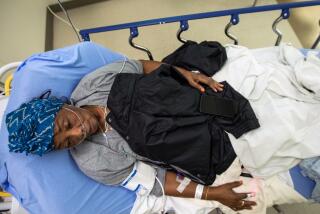A Look at Life After Breast Cancer
- Share via
When it comes to the quality of life for survivors of breast cancer, it is not ethnicity that is important, according to a new study by UCLA researchers. Instead, the key predictors are such sociological factors as life stress, relationship status, education and income.
Cancer is the great leveler, said Dr. Patricia Ganz of UCLA’s Jonsson Comprehensive Cancer Center. “You can be white, pink or purple, and cancer will be the common denominator. There’s a lot of talk about celebrating differences, but cancer survivorship is one area where we are more similar than dissimilar.”
Ganz and her colleague, psychologist Kimlin Ashing-Giwa of the cancer center and the California School of Professional Psychology, studied 117 African American and 161 Caucasian breast-cancer survivors from throughout the state. They reported in Friday’s issue of the journal Cancer that they found no differences in quality of life between the two groups based solely on race.
Those who reported the highest quality of life had better health perceptions, fewer stresses, higher incomes and better educations, regardless of race.
All of the women were doing well five to eight years after the initial diagnosis of cancer. “What we have found is reassuring,” Ganz said. “These women are functioning at a very good level.”
The United States now has more than 1 million breast cancer survivors. More than 180,000 women will be diagnosed with breast cancer this year.
Children Still Healthy After AZT Exposure
Children exposed to the anti-AIDS drug AZT before or shortly after birth and who do not contract AIDS show no adverse effects from the drug, according to the Pediatric AIDS Clinical Trial Group. The group studied 234 such children who are nearly 6 and will continue studying them until they’re 21.
The team reported in Wednesday’s Journal of the American Medical Assn. the reassuring news that the AZT-treated children showed normal growth and cognitive development, and none developed cancers or died.
British Soldiers Subject to Gulf War Syndrome
Gulf War Syndrome is apparently not restricted to American soldiers. The syndrome also affects British soldiers who served in the war, researchers reported in Saturday’s Lancet. Dr. Catherine Unwin and her colleagues at Guy’s, King’s and St. Thomas’ Medical School in London surveyed 4,249 U.K. servicemen who were deployed to the gulf, 4,250 who were deployed to Bosnia, and 4,246 who served during the Gulf War but were not deployed.
They found that those who served in the gulf were more likely to complain of headache, poor concentration, asthma, arthritis and rashes.
Compared with those who served in Bosnia, soldiers in the Gulf War were more than twice as likely to report substantial fatigue, symptoms associated with post-traumatic stress, and substantial psychological stress.
Hospital-Caused ICU Admissions Remain Level
Iatrogenic--or hospital-caused--admissions to intensive care units have not declined since 1980, according to a new study in the January Archives of Internal Medicine. Dr. Bruno Darchy and his colleagues examined all patients admitted to the ICU of General Hospital in Compiegne, France, in 1994 and found that 68 of the 623 patients suffered iatrogenic disease, about the same proportion found in a 1980 study.
The causes included medication interactions and drug overdoses in 41 patients, medical acts in 12 patients and surgical acts in 15.
Diabetic Neuropathy Caused Patients’ Pain
Several readers pointed out an error in this column last week. In an item about the use of magnets to relieve pain, it should have said that the patients in a double-blind trial had pain caused by diabetic neuropathy.






